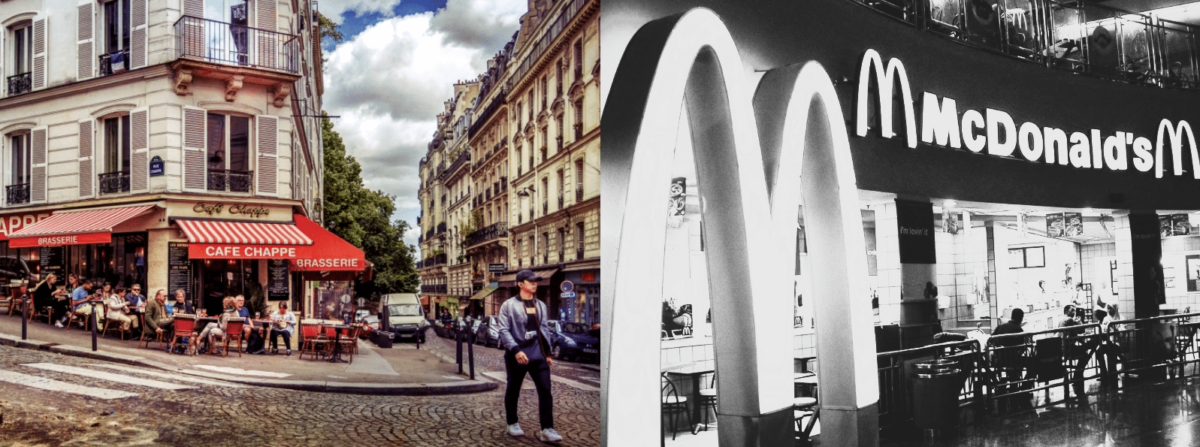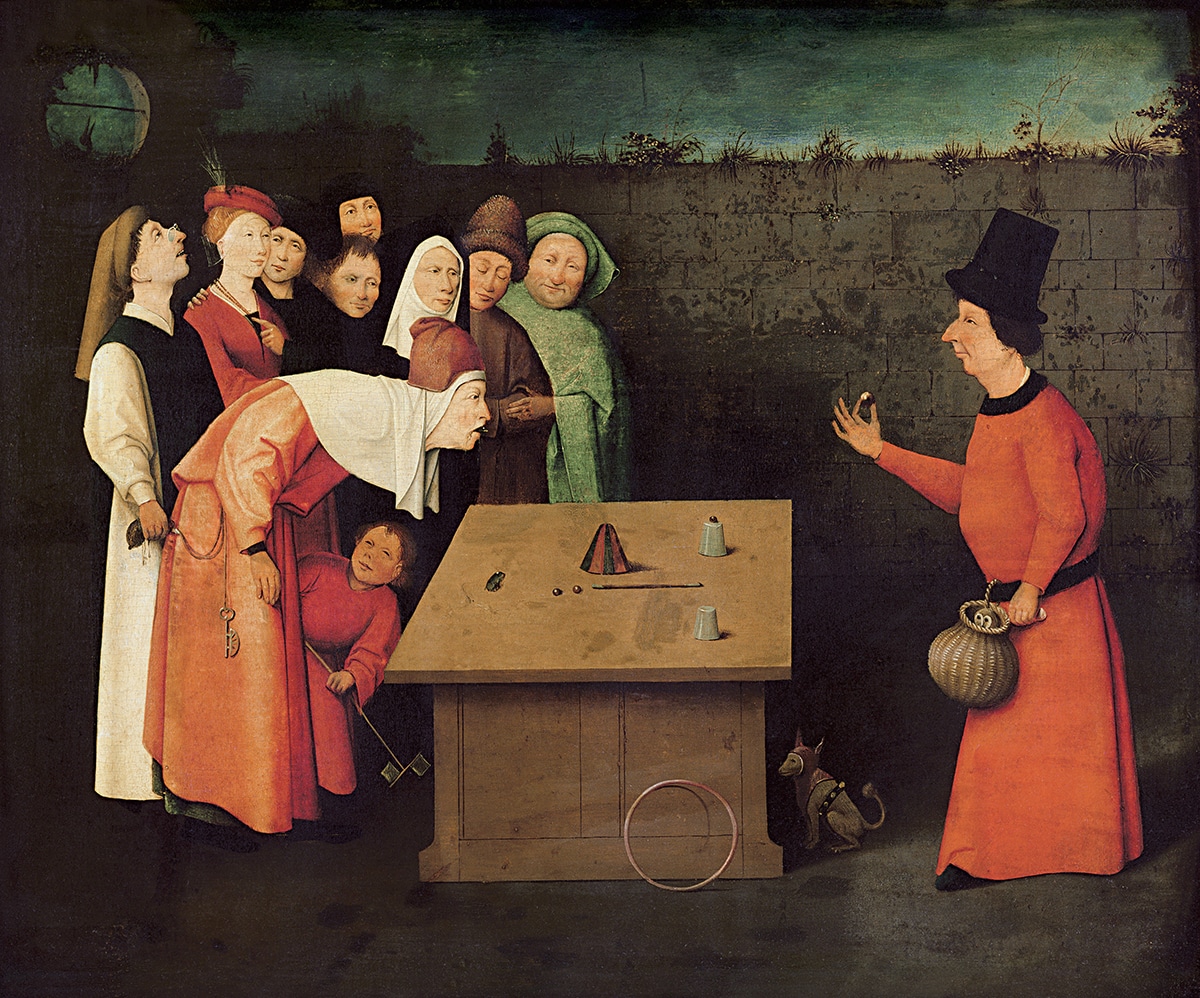

Modernisation means pillage and profit
by Paul Cudenec | Jan 31, 2025
As I have pointed out before, a big disruptive event like a war serves multiple purposes for the criminocrats. [1]
One of these is to initiate a Reset, a “building back better” of society that is not just highly profitable for them, but also advances their long-term industrial-authoritarian agenda.
Delphine Dulong sheds interesting light on this process in a book showing how the Second World War and then the Algerian war of independence were used to “modernise” French life and politics. [2]
This programme was advanced on a practical level through a series of state Plans, which I immediately equated with Soviet industrialism, but which have also been described as “more corporatist than truly democratic”. [3]
If the hint of fascism seems inappropriate in a post-war context, it is worth noting that Dulong detects the beginning of the “modernisation” movement, particularly in agriculture, in the corporatism of the Nazi-friendly Vichy regime in wartime France, which also launched a Ten-Year Plan. [4][5]
The aim of this modernisation was to complete the job that had been carried out with the First World War and do away with the traditional French outlooks and ways of living that were obstacles for global corporate control and exploitation.

Anything traditional, rooted in the past, was thus depicted as bad, old-fashioned, out-of-date and in need of being swept aside by the steel broom of industrial “progress”.
As one of the modernisers openly declared: “The essential conflict in contemporary France is between those who want to accelerate economic modernisation and those who want to slow it down, between those who want to bring France into the 20th century and those who want to keep it in the old days”. [6]
Their hostility even extended to the elevated and non-commercial emphasis of French (and European) culture as a whole, especially compared to the laudably money-orientated USA.
A telling 1953 article in the Jeune Patron (Young Boss) journal declared: “To be a guide in the domain of ideas in France, you have to be a scribe, you have to be an intellectual, you have to be a novelist, you have to be a philosopher.
“Sartre or Malraux are more important in French life than any industrialist.
“In America, the CEO of General Motors is much more important than Hemingway. There’s a big difference.
“It is America’s business chiefs who have political leadership, it is they who are responsible for the nation, it is they who really steer the life of the nation in one direction or another.
“In America, the economic leadership has become a political leadership; there is no leadership other than by the economic phenomenon”. [7]

The problem for those behind this endeavour was, however, that the French public remained fond of their old ways and customs and would not readily vote for politicians promoting such an approach.
So in order to modernise French life, the first task was to “modernise” French politics by bypassing the existing democratic process.
This was achieved by switching power away from elected politicians who were still, to some extent, answerable to the people and into the hands of faceless technocrats working behind the scenes.
Justifying this was the claim that in the bright new shiny post-war world, the country needed to be led by “experts” guided not by personal opinion or party loyalty but purely by cold rationality – by “the science” as they would say today.
The truth lay elsewhere, of course. Those pushing this agenda were no more “apolitical” than the organisation of that name whose insidious role in contemporary British politics was recently exposed by Ben Rubin. [8]
It was just that their agenda was a long-term one and not visible to most of the public because it was not presented to them as a “political” issue over which they had any right to exercise the control supposedly invested in them by “democracy”.

“Modernisation” was, as it always is, depicted as something that must and will inevitably come about, a necessary evolution of human society that advances hand-in-hand with the passing of time itself.
Its proponents complained in 1953 of French people’s “attachment to a certain archaic style of civilisation and almost total lack of knowledge of technological evolution”.
They added: “Dynamism too often gives way to a certain tendency for stagnation, which stifles it; and we cannot be sure that the ‘modus vivendi’ which has been established between rural and urban France in certain periods will end with a positive outcome in which dynamic action and the spirit of progress will win the day over the stagnation of practices and the respect of traditions”. [9]
Any fusty old nonsense that got in the way of this glorious techno-future was not fit for purpose and had to be swept away.
Such as the law, for instance. As moderniser Jean Rivero put it in 1965: “Understand that there is a Plan, we have drawn it up, we are executing it and the law has got nothing to do with it”. [10]
They favoured a law which was “supple and adaptable” – a preference close to the 21st century calls by Klaus Schwab of the WEF for “agile” governance. [11][12]
Parliamentary democracy was regarded as an obstacle to the fast-tracked advance to industrial modernity – all those “interminable debates” would just slow the whole thing down too much. [13]

There was, on the part of the modernisers, a “refusal to take part in political activity as defined by the forms of representative democracy”. [14]
Manoeuvres were carried out to instead exercise ultimate control through the instrument of one single person, the president.
This was made possible by the crisis in Algeria that broke out in 1954 and the great public esteem for WW2 resistance figurehead Charles de Gaulle.
When he was given special presidential powers in what some called a “semi-dictatorship”, it was widely assumed that these would apply purely to him, for the duration of the emergency, and that afterwards the power of parliament would be restored. [15]
But this was not the case and, furthermore, in 1962 the constitution was changed so that, instead of being chosen by parliament, the president was elected directly by the public.
As journalist/propagandist Roger Priouret had declared in 1959: “No doubt about the goal whose achievement would be welcomed by company heads, managers and integrated workers: they want a strong and stable executive capable of firmly steering the economy in the direction of industrial progress”. [16]

This switch to a more authoritarian form of government was a key feature of the post-war Fifth Republic and its effects are still in evidence today, with president Emmanuel Macron’s government pushing through law after law without a vote in parliament thanks to the handy “49.3” get-out clause inserted into French constitutional law.
Another important change described by Dulong was in the general understanding of what politics was all about.
No longer was it depicted as being concerned with values, principles, ideas, ethics or the interests of the French people.
Instead, it was all about money-making – or “the needs of the economy” as it was euphemistically termed by one moderniser in 1959. [17]
A key moment in the reorientation of French politics to serve the interests of Mammon came in 1960 with the controversial appointment, as finance minister, of Wilfrid Baumgartner, director of the Bank of France, the country’s central bank. [18]
President de Gaulle, as well as being a French nationalist rather than a Europeanist, was not particularly interested in economics and so, although his personal popularity was a useful battering ram in switching power from parliament to the president, he was not the ideal leader for the modernisation camp.
Georges Pompidou, president from 1969 to 1974, was a much better fit with the new notion of a president as a “competent” steward for the “economic” priority, after his many years working for the Rothschild bank. Macron also worked for the Rothschilds, as I may have previously mentioned!

“Change” was the keynote theme of the “modernisation” bandwagon, just as it is today for the likes of Keir Starmer and Tony Blair, with his revealingly-entitled Institute for Global Change.
The way people thought in France had to change in order to pave the way for the planned changes in their lives.
To achieve this, a new team had to be brought in to reshape public thinking.
Dulong describes in detail how a network of people was created to influence all sectors of French life, in the civil service, academia and the media.
This very much reminds me of the Common Purpose network in the UK (as exposed in depth by UK Column) and, indeed, I suspect the very same interests lay behind it. [19]
Dulong says this brought together organisations usually very remote from each other.
“It constituted, in fact, a real lacework of institutional relationships, often reinforced by links of personal friendship. In the words of Pierre Uri, it could thus be compared to ‘a spider’s web’”. [20]

Dulong explains that the network included senior civil servants, trade unionists and various specialists in the social sciences – economists, sociologists, political scientists and statisticians. [21]
They were selected for their technical “competence” rather than to represent the views of the French people.
She adds: “They had as a common characteristic the exercise of several activities at the same time: they taught in public establishments, took part in think tanks, collaborated with media companies, devoted part of their weekly schedule to trade union activities, research, advice and so on. They were therefore at the intersection of multiple socio-professional ‘sectors’ (administration, academia, journalism, etc) and thus benefited from additional resources which compensated to some extent for their relative marginality”. [22]
Dulong says they were of a quite different breed to previous generations of senior French civil servants – she cites research showing they were often “communists, protestants or Jews”, or from working-class families, some with backgrounds in the liberal professions and others in business. [23]
Their “political” background was somewhat elusive, with many having apparently been part of the French Resistance, though as this was an underground movement, this was not an official part of their CV.
Others had been involved with de Gaulle’s Free France parallel government in both Algiers and London. [24]
These new administrators were placed in the fast lane for promotion and quickly overtook older and more experienced individuals to occupy key posts. [25]
An important group in this phenomenon was the Club Jean-Moulin, which explicitly said it was involved in “the struggle for power” and described its aim as being “to facilitate the emergence of the new elites”. [26][27]

In a 1961 document called The State and the Citizen, effectively its manifesto, it called for “the end of ideology”, “egalitarian society”, “mathematical culture”, “the scientific spirit” – “rigour” rather than “intuition” – “the search for political rationality” and “efficient” political power. [28]
A controlled “left” was an important weapon in pushing through the “change” agenda, just as it is today with all the “woke” and “climate” posturing which reinforces the totalitarian Great Reset narrative.
Dulong writes that converting leftists to the modernisation cause was an openly-stated aim of these networks, with politician Gaston Defferre writing: “The left of opposition must become a left of management”. [29]
Whenever a regime – fascist, communist or “democratic” – wants to bulldoze the existing structures and morals of a society so as to impose its new model, it does so under the flag of “youth” and post-war France was no exception.
The technique is to brainwash young people into rejecting the ways of their elders and indoctrinate them to work for a “better” world that suits your own programme.
Jean Ripert, later high up in the UN, told Dulong in an interview that he became passionate about the Plan as a young man through reading a newspaper article by Jean Monnet, one of the leading French modernisers. [30]
“I was convinced, like a lot of people of my age, that it was an essential idea. Effectively I associated the liberal economy with disorder… But what most attracted me in this article was the expression ‘modernisation or decadence’.

“I said to myself: ‘There is something that is not working in this place. We are a country of old people, run by old people’”. [31]
This “generational” game was also used to push the industrialisation of French farming.
One of the modernisers wrote of “a generation faithful to economic norms very close to those of the Middle Ages confronted, without warning, by a generation extremely sensitised to the influence of the modern world… proclaiming its affiliation to the modern world”. [32]
But what, you might be wondering, was the aim behind all this “modernisation”? What was the driving purpose?
It was money, of course. Documents referenced by Dulong show clearly that what was at stake was the immediate and long-term “productivity” of France.
She reveals, for instance, that the Fonds de modernisation et d’équipement was set up with the express purpose of “transforming” public funds of all kinds into productive capital. [33]
In other words, certain interests wanted to remodel society so they could extract as much wealth as possible from the French people and their land.
The French state, in their hands, was merely a public-funded tool used to accelerate their private accumulation of wealth.

Alongside the internal subversion of French institutions, a great deal of propaganda was unleashed to brainwash the public into going along with the demolition of their traditional culture.
Dulong describes the technique of depicting two radically different kinds of French society, a binary opposition which invites only one preference.
“One was ‘static’, ‘immobile’, stuck in its own rut and corresponding to social conditions overtaken by history – those of ’19th century’ France – in summary, an ‘anachronistic’ society; the other was ‘transformational and evolutionary’, turned towards the future, in short a ‘modern’ society”. [34]
There was also a big propaganda effort to make The Economy the first and foremost political issue, with the publication of a series of books on the subject, aimed at the general public.
Dulong remarks: “All these works can be interpreted as attempts at a mobilisation aiming to interest ‘laymen’ in economic science”. [35]
She says that the same was true of a swathe of new magazines promoting the idea of “economic democracy”, which amounted to “the devaluing of parliamentary representation and the definition of a new type of political leadership”. [36]

Business “executives” were presented as a new class to be looked up to, there were a lot of fact-finding trips across the Atlantic as part of a “symbolic remodelling of society” and American-style opinion polls started playing an important role in France. [37][38][39]
The lines between public and private were increasingly blurred, with much interaction between business chiefs and senior civil servants. [40]
The state was run like a company, for the benefit of its private stakeholders, while private businesses were painted as benevolent bodies deserving of state support and providing prosperity for all. [41]
Claimed the propaganda: “Playing an essential role at the heart of the industrialisation phenomenon, our businesses increasingly constitute, for those who work in them, a human environment on which they depend for their blossoming”. [42]
The question of modernisation and its propaganda in France is also addressed by Pierre Rimbert in a 2005 book.
He remarks that although the process was set in motion after the war in the name of the general public interest, it ended up “only serving the dominant fractions of the dominant class”.
And he stresses: “The planners wanted above all to identify and eradicate social obstacles to economic growth”. [43]

Rimbert quotes arch-moderniser Monnet’s statement that the French “ought to adopt the ‘American psychology’, meaning ‘in a frame of mind for constant change’”. [44]
He also cites a 1964 report that called for “an effort of reflection: to compile the inventory of what will necessarily change, to measure the degree of resistance from various sectors becoming obsolete and to draw up a strategy of elimination”. [45]
He adds: “Those initially targeted were small businessmen, shopkeepers, craftsmen and, above all, the small farmers who represented a third of the active population at the end of the war”. [46]
The similarity to the current Great Reset programme really is striking!
Rimbert explains that because the first victims of this modernisation were generally associated with old-fashioned “right-wing” outlooks, the assault on traditional life was packaged as “progressive” and “left-wing”, even though it went on to threaten the livelihoods of a range of workers. [47]
His own focus is on the role of the French daily newspaper Libération in this “modernisation” psyop.
Originally founded in 1973 by Jean-Paul Sartre and others in the name of “giving a voice to the people” by reporting news and views independently of commercial interests, it was gradually turned round to face in completely the other direction. [48]
As it accepted advertising and outside “investors”, it increasingly adopted an editorial line that suited the global money-men. [49][50]

Comments Rimbert: “The fusion of the press with money determines its contents more efficiently than any kind of direct censorship, even if exercised by the owner”. [51]
Journalist Serge July, a co-founder of Libération who was at its helm from 1974 to 2006, said in 1991 that the newspaper “placed itself as the organ of economic modernisation at the start of the 1980s”. [52]
Colleague Laurent Joffrin, who later became editor, boasted in 1993: “We were the instruments of the victory of capitalism in the left”. [53]
Libération promoted a “second left”, pursuing the kind of “modern” Third Way politics embraced by the likes of Tony Blair and, as I showed recently, Rockefeller Foundation trustee Juan Carlos Santos. [54][55]
It became obsessed with “the economy”, praised Margaret Thatcher and took a pro-NATO stance during the first Gulf War and in Kosovo. [56][57][58]
In 2003, the invasion of Iraq by the US and its accomplices was met in France by what July condemned as “anti-American hysteria”.
He insisted: “The democratic world needs America. In a context of globalisation, political defeats for America are defeats for democracy”.
And he complained that the negative reaction to the neo-colonial occupation of the Middle Eastern country was prompting “bare-faced anti-semitism”. [59]

In the light of all this, the formal purchase in 2005 of the largest shareholding in the newspaper by a well-known zio-imperialist financier felt less like a take-over than the triumphant public declaration that the defeat of its original spirit was complete. [60]
The symbolism was certainly strong enough to provide the title of Rimbert’s book – Libération de Sartre à Rothschild (Libération from Sartre to Rothschild).
It seems clear to me that Edouard de Rothschild’s showboating and all the propaganda pushed out by Libération was the continuation of the process described by Dulong, whose book is in fact cited by Rimbert.
This is confirmed by the fact that she names as “the essential link in the chain, from beginning to end”, the politician Jacques Delors, who later became French finance minister and then, in 1985, president of the European Commission. [61]
Wikipedia notes: “During his presidency, he oversaw important budgetary reforms and laid the groundwork for the introduction of a single market within the European Community. It came into effect on 1 January 1993 and allowed the free movement of persons, capital, goods, and services within the Community.
“Delors also headed the Committee for the Study of Economic and Monetary Union, widely known as the Delors Committee, that in early 1989 proposed the creation of a new currency — the euro — to replace individual national currencies. This was achieved in the 1992 Maastricht Treaty”. [62]
The EU was always just a stepping stone towards an intended world industrial-authoritarian state.

During the period analysed by Dulong, Delors was employed in “a series of posts in French banking and state planning” with Baumgartner’s Bank of France.
These signs of a globo-criminocratic agenda at work are further reinforced by the fact that Dulong mentions the involvement in the post-war bid to “change” France of the Behavioural Sciences Center at Stanford, California, and funding from UNESCO, the Ford Foundation and the Rockefeller Foundation. [63][64]
As I have previously demonstrated, the latter is nothing but a front for the Rothschilds’ industrial-financial empire and its sinister bid to destroy traditional life and organic communities everywhere. [65]
The single global mafia’s move for world domination has been advanced under the false flag of “progress” so as to lull us into numbed acceptance of its supposed inevitability.
But we don’t have to accept the grim techno-totalitarian future the mafia has in mind for us.
If we can wake enough people up to the chilling reality behind its ongoing push for still more “modernisation”, “development” and “growth”, then we can turn our backs on that industrial prison-camp and stride out towards a free and natural tomorrow.

Subscribe to Paul Cudenec
Footnotes:
[1] Paul Cudenec, ‘Wars, resets and the global criminocracy’, https://winteroak.org.uk/2024/06/10/wars-resets-and-the-global-criminocracy/
[2] Delphine Dulong, Moderniser la Politique: Aux origines de la Ve République (Paris: L’Harmattan; 1997). All translations in this essay are my own – the original French versions can be found here.
[3] J-F Le Calonnec, ‘La planification et le droit’, Economie et humanisme, 140, 1962, p. 40, cit. Dulong, p. 50.
[4] Dulong, p. 19 FN.
[5] https://fr.wikipedia.org/wiki/Planification_en_France
[6]
M. Duverger, De la dictature (Paris: Julliard, 1961), pp. 41-42, cit. Dulong, p. 226.
[7] L. Salleron, ‘Le chef d’entreprise dans la cité, Jeune Patron, september-october 1953, pp. 31-33, cit. Dulong, p. 113.
[8] https://riseuk.substack.com/p/dereliction-of-duty
[9] Promotions, 26, 1953, pp. 123-24, cit. Dulong, p. 34.
[10] Jean Rivero; ‘Le Plan et le droit’, in La Planification comme processus de décision (Paris: A. Colin, 1965), p. 122, cit. Dulong, p. 44.
[11] Dulong, p. 48.
[12] See Paul Cudenec, ‘Klaus Schwab and his Great Fascist Reset’. https://winteroakextra.wordpress.com/2020/10/08/klaus-schwab-and-his-great-fascist-reset/
[13] P. Lamour, ‘Mutation de l’esprit critique’, La Nef, 15, 1963, p. 44, cit. Dulong, p. 174.
[14] G. Burdeau, Note préparatoire à la table ronde de l’AFSP de novembre 1960, citée in G. Vedel, dir, La dépolitisation. Mythe ou réalité (Paris, A. Colin, 1962), p. 12, cit. Dulong, p. 186.
[15] B. Lavergne, ‘Perspectives de politique intérieure française’, L’Année politique et économique, 163, 1961, pp. 343-345, cit. Dulong, p. 224.
[16] Roger Priouret, La République des députés (Paris: Grasset, 1959), p. 251, cit. Dulong, p. 227.
[17] M. Vasseur, Le droit de la réforme des structures industrielles et des économies régionales (Paris: LGDJ, 1959), p. 516, cit. Dulong, p. 48.
[18] Dulong, p. 163.
[19] https://www.ukcolumn.org/series/common-purpose-effect
[20] Dulong, pp. 14-15.
[21] Dulong, p. 11.
[22] Dulong, pp. 17-18.
[23] B. Gaïti, De la IVe à la Ve République. Les conditions de la réalisation d’une prophétie, PhD thesis, Université Paris I, 1992, cit. Dulong, p. 18.
[24] Dulong, p. 19.
[25] Ibid.
[26] Club Jean-Moulin, L’Etat et le citoyen (Paris: Seuil, 1961), p. 379, cit. Dulong, p. 199.
[27] Brochure du centre d’information et de documentation, Archives du club J. Moulin, 1CJM7/dossier 7, cit. Dulong, p. 149.
[28] Club Jean-Moulin, L’Etat et le citoyen, p. 409, cit. Dulong, p. 151.
[29] Gaston Defferre, Un nouvel horizon (Paris: Gallimard, 1965), pp. 21-22, cit. Dulong, p. 266.
[30] https://fr.wikipedia.org/wiki/Jean_Ripert
[31] Dulong, p. 20.
[32] M. Debatisse, La révolution silencieuse. Le combat des paysans (Paris: Calmann-Lévy, 1963), p. 47, cit. Dulong, pp. 119-20.
[33] Dulong, p. 15.
[34] Dulong, p. 9.
[35] Dulong, p. 63.
[36] Dulong, p. 69.
[37] Dulong, p. 81.
[38] Dulong, p. 78.
[39] Dulong, p. 132.
[40] Dulong, p. 112.
[41] Dulong, p. 106.
[42] ‘L’enjeu de la civilisation industrielle’, Cahiers du CRC, 6, 1961, p. 91, cit. Dulong, p. 108.
[43] Pierre Rimbert, Libération de Sartre à Rothschild (Paris: Editions Raisons d’Agir, 2005), pp. 84-85.
[44] Rimbert, p. 85.
[45] Groupe 1985, Réflexions pour 1985, La Documentation française, 1964, p. 104, cit. Rimbert, p. 86.
[46] Rimbert, p. 86.
[47] Rimbert, pp. 86-87.
[48] Rimbert, p. 9.
[49] Rimbert, p. 50.
[50] Rimbert, p. 60.
[51] Rimbert, p. 133.
[52] Serge July, ‘Introduction à Libération 111’, 1991, cit. Rimbert, p. 128.
[53] Quoted in ‘Les années Libé‘, a film by Michel Kaptur, France 2, 2 June 1993, cit. Rimbert, p. 114.
[54] Rimbert, p. 102.
[55] See Paul Cudenec, ‘The Single Global Mafia’. https://winteroak.org.uk/wp-content/uploads/2025/01/cudenec-the-single-global-mafia.pdf
[56] Rimbert, p. 112.
[57] Rimbert, p. 55.
[58] Rimbert, p. 116.
[59] Rimbert, p. 116.
[60] Rimbert, p. 63.
[61] Dulong, p. 157.
[62]
https://en.wikipedia.org/wiki/Jacques_Delors
[63] Dulong, p. 87.
[64] Dulong, pp. 40-41.
[65] Cudenec, ‘The Single Global Mafia’.






0 Comments